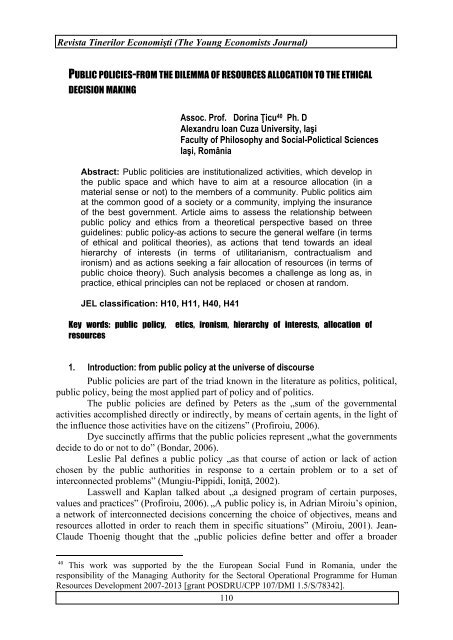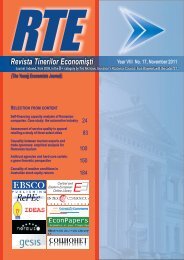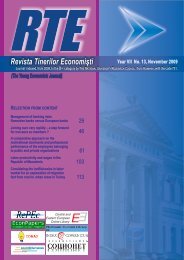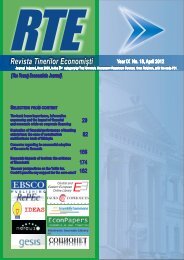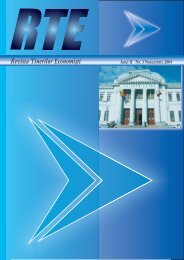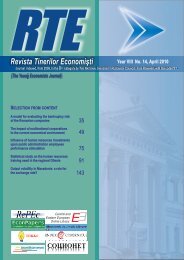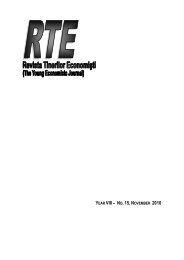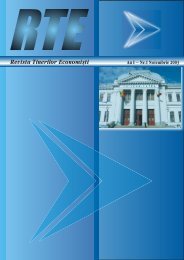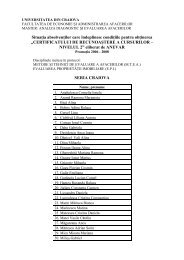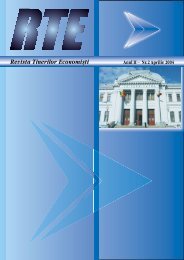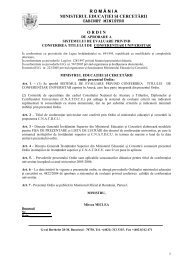Revista Tinerilor Economiºti (The Young Economists Journal)
Revista Tinerilor Economiºti (The Young Economists Journal)
Revista Tinerilor Economiºti (The Young Economists Journal)
You also want an ePaper? Increase the reach of your titles
YUMPU automatically turns print PDFs into web optimized ePapers that Google loves.
<strong>Revista</strong> <strong>Tinerilor</strong> Economişti (<strong>The</strong> <strong>Young</strong> <strong>Economists</strong> <strong>Journal</strong>)<br />
PUBLIC POLICIES-FROM THE DILEMMA OF RESOURCES ALLOCATION TO THE ETHICAL<br />
DECISION MAKING<br />
Assoc. Prof. Dorina Ţicu 40 Ph. D<br />
Alexandru Ioan Cuza University, Iaşi<br />
Faculty of Philosophy and Social-Polictical Sciences<br />
Iaşi, România<br />
Abstract: Public politicies are institutionalized activities, which develop in<br />
the public space and which have to aim at a resource allocation (in a<br />
material sense or not) to the members of a community. Public politics aim<br />
at the common good of a society or a community, implying the insurance<br />
of the best government. Article aims to assess the relationship between<br />
public policy and ethics from a theoretical perspective based on three<br />
guidelines: public policy-as actions to secure the general welfare (in terms<br />
of ethical and political theories), as actions that tend towards an ideal<br />
hierarchy of interests (in terms of utilitarianism, contractualism and<br />
ironism) and as actions seeking a fair allocation of resources (in terms of<br />
public choice theory). Such analysis becomes a challenge as long as, in<br />
practice, ethical principles can not be replaced or chosen at random.<br />
JEL classification: H10, H11, H40, H41<br />
Key words: public policy, etics, ironism, hierarchy of interests, allocation of<br />
resources<br />
1. Introduction: from public policy at the universe of discourse<br />
Public policies are part of the triad known in the literature as politics, political,<br />
public policy, being the most applied part of policy and of politics.<br />
<strong>The</strong> public policies are defined by Peters as the „sum of the governmental<br />
activities accomplished directly or indirectly, by means of certain agents, in the light of<br />
the influence those activities have on the citizens” (Profiroiu, 2006).<br />
Dye succinctly affirms that the public policies represent „what the governments<br />
decide to do or not to do” (Bondar, 2006).<br />
Leslie Pal defines a public policy „as that course of action or lack of action<br />
chosen by the public authorities in response to a certain problem or to a set of<br />
interconnected problems” (Mungiu-Pippidi, Ioniţă, 2002).<br />
Lasswell and Kaplan talked about „a designed program of certain purposes,<br />
values and practices” (Profiroiu, 2006). „A public policy is, in Adrian Miroiu’s opinion,<br />
a network of interconnected decisions concerning the choice of objectives, means and<br />
resources allotted in order to reach them in specific situations” (Miroiu, 2001). Jean-<br />
Claude Thoenig thought that the „public policies define better and offer a broader<br />
110<br />
40 This work was supported by the the European Social Fund in Romania, under the<br />
responsibility of the Managing Authority for the Sectoral Operational Programme for Human<br />
Resources Development 2007-2013 [grant POSDRU/CPP 107/DMI 1.5/S/78342].


